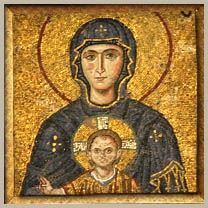Here's a page dedicated to this famous mosaic in the apse sem-dome of the great cathedral church of old Byzantium. It dates from the original redecoration of the church after iconoclasm ended.







CHAPTER 18
CONCERNING THE CHILDREN
WE returned to Tsarskoe Selo early in November, and stayed there till after Christmas, then as usual went to St. Petersburg for New Year's Day.
There was a very gay season that year, many bails and dinners and supper parties. The year before there was no gaiety owing to the Court being in mourning for Queen Victoria.
The Crown Prince of Germany paid us a visit, and became very intimate with his little cousins. His visit was spoiled, however, by an attack of influenza.
The early part of the year passed just as usual. The little Grand Duchess Tatiana now began to learn English reading and writing; Olga's education was of course much further advanced. She had masters for music and Russian. Both children have a very marked talent for music; the Empress and some of her sisters are very musical, but the Emperor neither plays nor sings. He is, however, very fond of music. He told me he could not learn because his masters insisted on his playing by note, and he preferred picking up tunes he liked by ear.
One day the arithmetic master, a professor of algebra from one of the universities, wished Olga to write something; she asked his leave to go in to the Russian master, who was teaching little Tatiana in the next room. He said she could go, but asked her what she wanted to say to him. She told him she could not spell "arithmetic." He told her how this difficult word was written, and she exclaimed, with great admiration, "How clever you are! and how hard you must have studied to be able, not only to count so well, but to spell such very long words!" She thought me a marvel of education, and confided in her music master that no one in the whole world knew so much as I did; she thought I knew everything, except music and Russian.
Though she is in some things advanced beyond most children of her age, in others she is far behind them. This arises, of course, from her very sheltered life.
On one occasion the milliner brought them new hats, with which she was greatly pleased; she told me she thought Madame B. was the very kindest woman in the world. " She went all the way to Paris," she said, "and brought us a present of those beautiful hats." I explained that it was madame's business, and that the hats had been bought, not given as a present. She looked a little puzzled, and then said, "I am afraid you are making a mistake; you did not give her any money, and I know she did not go to mama for it."
Her only knowledge of shops and shopping was derived from the toy and sweet shops in Darmstadt. One day she asked me why the Americans spoke English, not American. I told her the story of the Pilgrim Fathers, and described how they built houses and shops, and so made towns. She was exceedingly interested and inquired, "Where did they find the toys to sell in the shops?"
I was reading "Alice in Wonderland" and "Through the Looking-Glass" to them lately, and she was horrified at the manners of the queens. "No queens," she said, "would be so rude." When I read about Alice's journey by railway she was exceedingly amused, and thought it very funny that she had not a compartment to herself. I told her in travelling each person took one ticket and occupied just one seat in the train, and told her some tickets cost more than others, and the highest-priced tickets meant a better place in the train.
She listened and said, "And when you travel can anyone with the same kind of ticket you have get into the same carriage as you do? "I told her, "Yes." So she said, " If I were you, I should take a whole compartment for myself." I said, "But you forget that these other people might object to me, and say, 'I won't sit beside that person.'" "Oh no," said she. "Everyone in the whole world would be glad to sit beside you."
Lately she was reading some little stories from English history; she read about the English cutting off the Welsh Prince Llewellyn's head, and sending it to London. She was awfully shocked, and read the story again. Then she exclaimed, " Well, it was a good thing he was dead before they cut off his head; it would have hurt him most awfully if he was alive." I said that they were not always so kind, and sometimes cut the heads off living people, and later she would read of them doing such things. She said, " Well, I really think people are much better now than they used to be. I'm very glad I live now when people are so kind."


